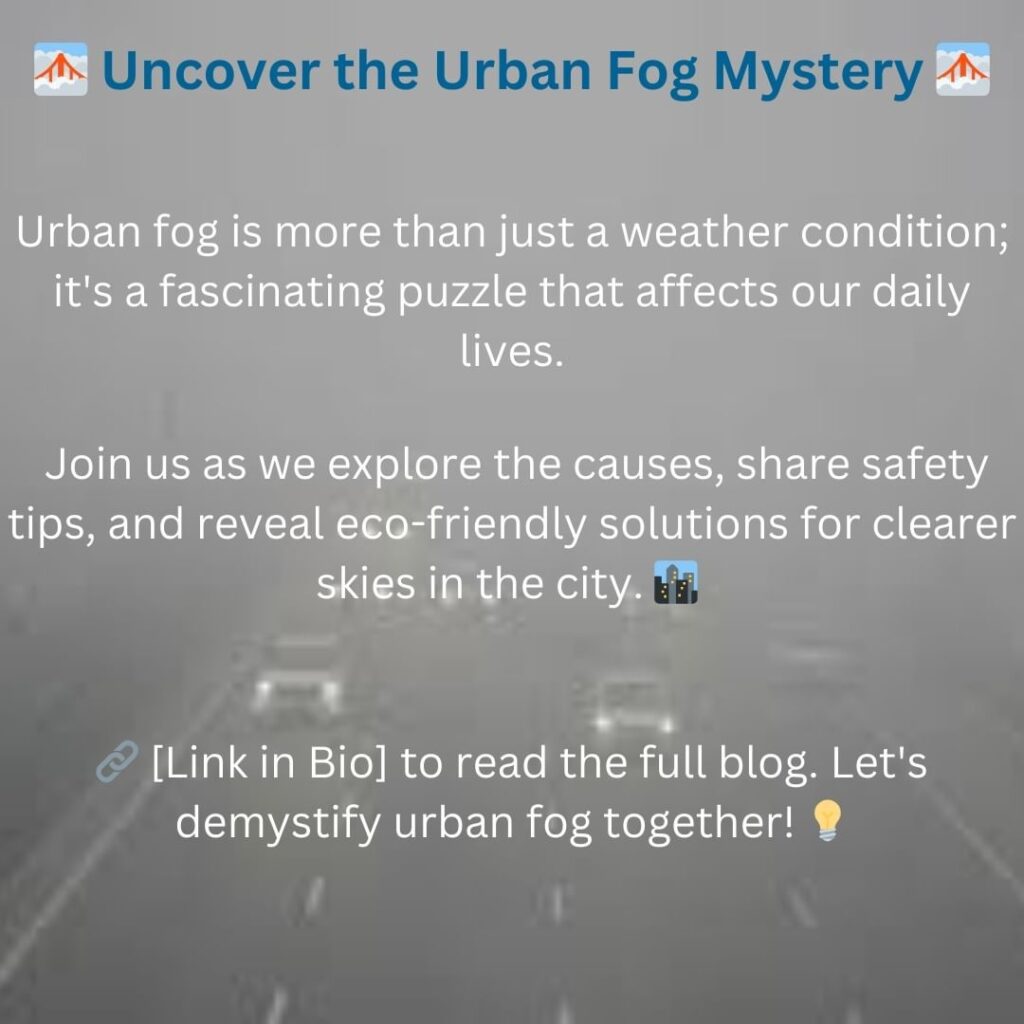“Unravel the mysteries of urban fog – its causes, precautions, and steps toward a clearer tomorrow. Explore the science behind city fog and learn how to navigate it safely. Join the journey to cleaner, crisper urban skies!”
Introduction: Decoding Urban Fog – A Cloak of Mystery and Challenge
Fog often blankets our cities, creating an air of mystery and beauty. However, it can also present significant challenges, affecting visibility, transportation, and overall quality of life. In this blog, we’ll explore the causes of fog in urban areas, precautions to take during foggy conditions, and the steps needed to enjoy cleaner, clearer weather.
Causes of Fog in the City:
- Temperature Inversion: One of the primary causes of fog in urban areas is a temperature inversion. This occurs when a layer of warm air traps cooler air near the ground. The moisture in the cool air condenses, creating fog.
- High Humidity: Cities near bodies of water or with high humidity levels are more prone to fog. The moist air provides ample water vapor for fog formation.
- Air Pollution: Urban areas with high pollution levels can exacerbate fog. Tiny particles in the air serve as nuclei for water droplets to condense around, making fog denser and longer-lasting.
Precautions During Fog:
- Reduce Speed: If you’re driving, slow down and maintain a safe following distance. Reduced visibility makes it essential to drive cautiously.
- Use Lights: Keep your vehicle’s headlights on low beam to improve visibility. Avoid using high beams as they can reflect light off the fog and reduce visibility.
- Stay Informed: Monitor weather reports and traffic updates. Sometimes, it’s safer to delay or cancel travel plans during dense fog.
- Walk Safely: If you’re walking, wear reflective clothing and stay on sidewalks. Make yourself as visible as possible to drivers.
Steps for Cleaner Weather:
- Air Quality Improvement: Reducing air pollution is crucial. Governments and communities should invest in cleaner energy sources, public transportation, and regulations to reduce emissions.
- Green Spaces: The presence of green spaces within cities helps maintain air quality and reduces temperature inversions. Planting more trees can improve air circulation and lower humidity.
- Sustainable Urban Planning: Incorporating sustainable urban planning can make cities more resilient to fog-related challenges. This includes better drainage systems and efficient public transportation.
- Awareness and Education: Public awareness campaigns can encourage responsible habits, such as reducing vehicle emissions and conserving energy.
Conclusion: Urban fog and A Path to Clarity
Fog in the city is a double-edged sword – it adds a touch of beauty but can also disrupt daily life. Understanding its causes, taking precautions during foggy conditions, and making efforts to improve air quality are vital steps towards cleaner, clearer weather in urban areas. By working together, we can enjoy the beauty of fog while ensuring a safer and more sustainable urban environment.
Further Reading:
For additional safety tips on dealing with potentially aggressive situations during your walks, check out “12 Ways of Safety First: How to React When Confronted by Barking Dogs During Your Way“.
Do Follow for More Tips and Inspiration:
- Instagram: Follow us on Instagram
- Pinterest: Follow our Pinterest profile
FAQs
- What causes fog to form in urban areas?
- How does temperature inversion contribute to urban fog?
- What role does air pollution play in the formation of city fog?
- What precautions should I take when driving in foggy conditions?
- How can pedestrians stay safe during fog?
- What are some tips for improving visibility while walking or driving in fog?
- How can cities reduce air pollution to mitigate fog formation?
- What impact does green space have on urban fog levels?
- How can sustainable urban planning help address fog-related challenges?
- What can individuals do to contribute to cleaner, clearer weather in cities?
